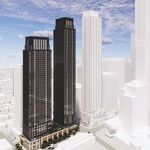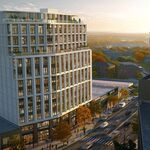299 bloor call control.
Senior Member
I attended a panel discussion at the Munk Centre yesterday discussing 'An Alternative Planning Process for Toronto' preceding the Jane Jacobs Awards. Definitely was one of the more interesting discussions I've been to lately and below is an excerpt from the 1000+ word response on my blog.
The discussion will be put online in the next few days, I'll post it when it comes up - definitely worth listening to.
The discussion will be put online in the next few days, I'll post it when it comes up - definitely worth listening to.
read the rest hereAn Alternative Planning Process for Toronto
Fixing Toronto’s “broken” and “dysfunctional” planning process was the subject of a panel discussion yesterday at the Munk Centre at the University of Toronto, hosted by the Institute on Municipal Finance and Governance (link). It was one of the more insightful and positive panel discussions I have attended lately and there are some good ideas coming out of it, but also some pressing questions. Sadly, there was only time for three questions and I left without being able to ask mine; however, I will be emailing Councillor Adam Vaughan to pose it, and hopefully have an answer on here later on.
There were three speakers on the panel, the first being Howard Cohen, a partner at Context Developments, probably my favourite developer in Toronto, behind such projects as Radio City, Sp!re, and the recently announced Market Wharf (incidentally, Market Wharf is at 18 Lower Jarvis Street, the site I had chosen in my 4th year Land Development Planning course). The second speaker was Dina Graser, who is part of People Plan Toronto, a collection of community and ratepayer groups and interested individuals who are advocating for an improved planning process in Toronto. And finally, Councillor Adam Vaughan (Ward 20 - Trinity Spadina), who has been proactively engaging his constituents on the large number of new developments in his ward.
Each speaker began with their evaluation of the current planning process in the City and several recurring themes emerged. The first was that the Planning Department is chronically understaffed and underfunded, and even worse, demoralized. The department is taking on too much with insufficient resources and seeing their work opposed by citizens and politicians. Which leads to the second theme - the Ontario Municipal Board. Ms. Graser called for the outright abolishment of the OMB, while Councillor Vaughan’s new process would lead to the OMB’s natural demise. Mr. Cohen remained mum on the issue, though I did not sense he had a feeling either way. It was clear though from all three speakers that the OMB was a major obstacle to effective city planning.
The third theme was the need to give community groups the resources and ability to be involved in the process in a positive and constructive way. Public participation too often occurs too late in the planning process and when it does, is often a collection of NIMBYs and BANANAs. Educating the public and involving them early in the process would create a more amicable and productive dialogue.
Finally, there was a call for a change in the political process. “The ward councillor reigns supreme” was probably the quote of the day from Mr. Cohen, and was echoed by both Ms. Graser and Councillor Vaughan. Not to mention that all planning matters, from a large condo to a new fence, end up before the community councils with little pre-evaluation and useful feedback. Mr. Cohen called for the creation of a Planning Committee to vet development applications and provide recommendations - and therefore giving councillors a backbone to back developments that are good city building, but bad politicially.
The main act of the panel discussion was clearly Councillor Vaughan’s proactive planning process he was elected on and has effectively implemented since taking office. I have to give Councillor Vaughan a lot of credit - few politicians at City Hall take planning as seriously as he does, and even fewer are as dedicated to the cause. He has taken a “no one is privileged” approach to development information - quickly disseminating information to his community as soon as it reaches his office and encouraging the public to be immediately involved. This involvement is realized through countless consultation sessions which allows developers and residents to work together to resolve the issues before it reaches the statutory process. He claims that since putting this approach into place, applications reach the statutory phase with all issues already resolved, therefore ‘fast-tracking’ approval - saving the developers money and removing the threat of litigation in front of the OMB. It is quite possibly a win-win-win situation.
Another part of Councillor Vaughan’s approach is to engage the community in voicing their needs, concerns, and desires for their neighbourhoods through mental mapping (a project conducted with the assistance of Ryerson planning students - cheap labour!). The result will be a website where residents and developers can better understand the community and be aware of its sensitivities. This in itself would help developments ‘fit’ into its context and developers would not be blindsided by unexpected issues. Furthermore, this project would form the basis of an ’scoring sheet’ on which all developments would be evaluated. The advantage of this type of method is in consistent expectations - again, no one would be surprised, and everyone knows what is expected.




